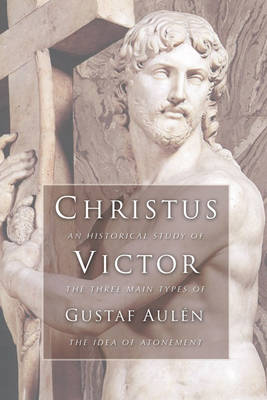
Door een staking bij bpost kan je online bestelling op dit moment iets langer onderweg zijn dan voorzien. Dringend iets nodig? Onze winkels ontvangen jou met open armen!
- Afhalen na 1 uur in een winkel met voorraad
- Gratis thuislevering in België vanaf € 30
- Ruim aanbod met 7 miljoen producten
Door een staking bij bpost kan je online bestelling op dit moment iets langer onderweg zijn dan voorzien. Dringend iets nodig? Onze winkels ontvangen jou met open armen!
- Afhalen na 1 uur in een winkel met voorraad
- Gratis thuislevering in België vanaf € 30
- Ruim aanbod met 7 miljoen producten
Zoeken
Christus Victor
An Historical Study of the Three Main Types of the Idea of Atonement
Gustaf Aulen
Paperback | Engels
€ 44,45
+ 88 punten
Uitvoering
Omschrijving
Gustaf Aulen's classic work, 'Christus Victor', has long been a standard text on the atonement. Aulen applies history of ideas' methodology to historical theology in tracing the development of three views of the atonement. Aulen asserts that in traditional histories of the doctrine of the atonement only two views have usually been presented, the objective/Anselmian and the subjective/Aberlardian views. According to Aulen, however, there is another type of atonement doctrine in which Christ overcomes the hostile powers that hold humanity in subjection, at the same time that God in Christ reconciles the world to Himself. This view he calls the classic idea of the atonement. Because of its predominance in the New Testament, in patristic writings, and in the theology of Luther, Aulen holds that the classic type may be called the distinctively Christian idea of the atonement.
Specificaties
Betrokkenen
- Auteur(s):
- Uitgeverij:
Inhoud
- Aantal bladzijden:
- 182
- Taal:
- Engels
Eigenschappen
- Productcode (EAN):
- 9781592443307
- Verschijningsdatum:
- 5/09/2003
- Uitvoering:
- Paperback
- Formaat:
- Trade paperback (VS)
- Afmetingen:
- 142 mm x 202 mm
- Gewicht:
- 222 g

Alleen bij Standaard Boekhandel
+ 88 punten op je klantenkaart van Standaard Boekhandel
Beoordelingen
We publiceren alleen reviews die voldoen aan de voorwaarden voor reviews. Bekijk onze voorwaarden voor reviews.











